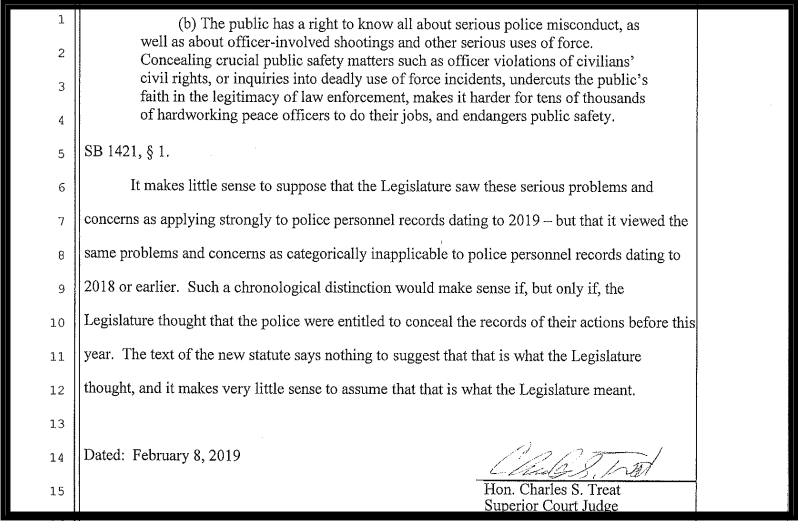On Friday, a Contra Costa County Superior Court judge became the first jurist to rule on the retroactivity of a newly enacted police transparency law, SB 1421.
The judge’s ruling requires police departments to release police disciplinary records created prior to 2019, and deals a major blow to law enforcement unions fighting to drastically narrow the scope of the new law.
On January 1, SB 1421 rolled back a 1978 law that, for four decades, made California the most secretive state in the country regarding law enforcement records.
The new law makes records related to police misconduct and serious and fatal uses of force available to the media and the public via California Public Records Act requests.
SB 1421 requires law enforcement agencies to release records of incidents in which officers use force–specifically, when cops discharge their firearms or Tasers, use a weapon to strike a person’s head or neck, or use force that results in serious bodily harm or death.
Records of on-duty sexual assault, including when cops exchange sex for leniency, are available to the public, under the new police transparency law.
SB 1421 also grants the public access to personnel records of officers who are found to have been dishonest in the “reporting, investigation, or prosecution of a crime.” Until this year, even prosecutors have been barred from accessing personnel records that may impact their cases, even for officers with a history of lying in police reports or planting evidence.
Over the last two months, law enforcement unions across the state have fought to keep police personnel data out of the hands of the media and the public, arguing in court that the new law should not be applied to records made before 2019, because the bill did not expressly declare the changes to be retroactive. However, the bill’s author, Senator Nancy Skinner (D-Berkeley), has said that she intended the law to apply to all eligible records in law enforcement agencies’ possession.
Until Judge Charles Treat’s decision on Friday, superior court judges were invariably siding with police unions, and issuing temporary orders barring departments from releasing pre-2019 records. (WLA wrote extensively about this ongoing battle last month.)
State legislators drafted and passed SB 1421 in response to concerns that “concealing crucial public safety matters such as officer violations of civilians’ civil rights, or inquiries into deadly use of force incidents, undercuts the public’s faith in the legitimacy of law enforcement,” and “makes it harder for tens of thousands of hardworking peace officers to do their jobs, and endangers public safety.”
Thus, Judge Treat said, “it makes little sense to suppose that the Legislature saw these serious concerns as applying strongly to police personnel records dating to 2019—but that it viewed the same problems and concerns as categorically inapplicable to police personnel records dating to 2018 or earlier.”
Judge Treat’s collective ruling applies to six different cases affecting police departments in five cities—Antioch, Concord, Martinez, Richmond, and Walnut Creek—and the Contra Costa County Sheriff’s Department. It is expected that the unions will appeal the decision, however, leaving SB 1421 in legal limbo.


https://www.sfgate.com/bayarea/article/Contra-Costa-judge-slapped-for-action-in-son-s-4697899.php
So this fool rules on cases involving misconduct with cops! Hypocrite!
Those folks on the bench in the black robes are much too full of themselves. Who judges a judge…their peers? Yeah right! As a defendant before the court, do I have the right to know the judges disciplinary history? Judges are human, so don’t tell me they do no wrong, make no mistakes and have to incidents requiring discipline. Maybe judicial influence, pressure, arm twisting and cover-up are the norm of the day? Perhaps their judicial protectors (LEO’s) run intereference for them.
Hopefully this case flies through the useless 9th and goes to the US Supreme Court.
Meanwhile in Southern California, specifically Caren Carl Mandoyan and his controversial disciplinary record which would be a prime real time example.
Perhaps SB 1421 and it’s timing expeditiously pushed Sheriff Villanueva to reinstate Mandoyan in 2018 to diminish some of the backlash (without in depth investigation of his discipline) and public outcry, even by fellow deputies.
There is nothing controversial about the Mandoyan case. Is that you Diane? SB 1421 doesn’t apply if you bothered to read it. But don’t let facts get in the way of a good rant!
“There is nothing controversial about the Mandoyan case.”
Did you click your heels together three times before saying this?